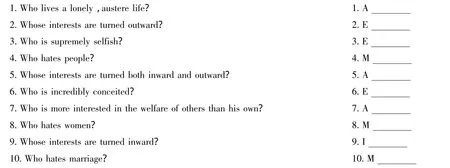词源学知识对词汇学习的意义及课堂使用方法初探
2015-12-24张晓丽
张晓丽
(上海政法学院外国语学院,上海201701)
引 言
本文探讨的内容始源于本人使用Word Power Made Easy(作者为美国学者Norman Lewis)这本书受益匪浅的学习体会。这本书的宗旨是利用词源学方面的知识帮助学习者更高效地学习词汇。我认认真真基本按照作者所要求的方法从头到尾学习了一遍,整个过程紧张、愉快、高效、让人兴奋,每个章节学习之后,都有一种明显、强烈的收获感。由此,我想到,如果把这本书的词汇学习思路引入大学英语课堂,也许能对学生们普遍头痛的词汇学习产生很好的作用。本文就是以此书为基础关于这方面的思路所做的整理和探讨。
一、词源学的定义及对词汇学习的意义。
词源学的主要研究对象是单词的来源和衍生过程。知道了词根的意思(比如:ego这个词根的意思是“我,自己”),就可以更好地理解并能更容易地记住建立在此词根之上很多单词的意思(比如egoist,egotist,egocentric,egomaniac,alter ego等)。就英语来讲,大多数情况下,知道一个词根的意思,能有助于理解十个至二十个与这个词根有关联的单词的意思。例如,知道了anthropos(来自希腊语,意思是“人类”)这个词根的意思,就能很快并且更加长久记住以下这些单词的意思:anthropology,anthropologist,misanthropy,anthropic,anthropogeny,anthropoid,anthropocentric,anthropomorphic,philanthropy,anthropophobia,等等。至少,看到词汇有anthropo-这样的构成成分,对词汇的意思就能做些合理的猜测。
从词源学的角度来学习词汇,主要着重于以下内容的学习和能力提高:
1)了解并识别构词成分,如:前缀、词根、后缀;
2)通过识别单词的构成成分来推知单词意思;
3)通过适当搭配单词构成成分来构建新的单词;
4)能够从一种单词词性推知到其他单词词性,比如:从名词形式衍生出其动词形式,从形容词形式衍生其名词及动词形式等等;
可见,有了一定的词源学知识积累,有了推测新鲜词汇意思的各种方法,学习者面对新的词汇时就会多一份自信和轻松,
二、使用Word Power Made Easy这本书的体会。
正如本书作者在书本开始部分所建议的:这本书跟一般其他的书不同,并不适合静静地浏览阅读,而是需要读者真正参与进来的(Pxv:Don't read this book!Instead,work with it.Write in it,talk aloud to it,talk back to it—use your pen or pencil,your voice,not just your eyes and mind)。这正是这本书的魅力所在。我发现我在使用本书的过程中,的确是按照作者的设计的步骤,不停地读、不停地写,反复地使用和记忆,整个过程紧张、高效、令人兴奋。笔者后来反思,我之所以能有这样丰满的学习体会,主要归功于本书作者对本书结构的匠心设计。
首先,本书作者一开始就针对提高词汇量的必要性给出了足够有科学实证分量的理由:
1)人类工程实验室的研究发现:该国成功人士的唯一共同之处就是有着对词汇意义不同寻常的理解能力。该实验室对各个年龄段和各行各业人的词汇量进行了测试,发现薪酬最高的人词汇量得分最高。该实验室主任的解释是这样的:“人们正是通过词汇这个工具来理解其他人的思想的,也是通过词汇这个工具进行自己的思考的。词汇是思维的工具。”
2)在许多大学,把部分新生放进专门提高词汇量的实验课堂里。结果发现,这些实验组的学生在接下来的大二、大三、大四学年均表现得要比对比组中没有接受过词汇提高训练的学生要出色。
3)伊利诺州大学曾给每个入校学生作过一个包括29个单词的词汇测试。据说,这个测试结果可以用来准确预测学生们将来的学业成就。“如果一个学生拥有出色的词汇量,几乎可以断定他会在学业上取得更好的成绩。”
4)教育研究已经发现,词汇量和智商密切相关。标准词汇测试的成绩和智商测试结果往往惊人地一致。
这样做完全符合学习动力原则。有了充足的动力,学习者的热情自然充足高涨!
其次,本书作者回顾了人在童年时(十岁之前)词汇量提高的高效状态并指出了其中的原因所在。作者指出:十岁之前,我们并没有每天专门花数个小时用在记忆词汇上;我们并没有通宵达旦、夜以继日专门攻读词汇字典;遇到不理解的词我们并不是立马就要翻查字典。作者继续一针见血地指出:童年之所以能够如此高效积累词汇,其本质原因在于:童年的我们在不断地进行着学习、不断地在吸收新鲜信息!孩子们的知识增加了,他们需要相应的词汇来表达新的见闻、新的思考、新的理解,所以词汇量自然增加了!成年人词汇量之所以提高没那么快,根本原因在于渐渐失去了学习新鲜事物的迫切愿望!这个见解深中肯綮,直指这样一个事实:词汇说到底不过是思想、知识的外在表达工具。增加词汇的根本途径在于不断扩充知识范围,增加新鲜知识!
基于此,这本书的组织方式严格遵循两个原则:1)词汇是思想的语言外在表达符号;2)一个人知识越丰富,思想越活跃,一个人掌握的词汇就越丰富。这两个原则被作者严格贯彻到了每一章节的组织架构中。本书的每一章都以讨论某一领域的话题开始,比如说性格类型、医生、科学、不寻常的职业、撒谎者、行动、说话习惯、侮辱、奉承,等等,接着作者列出探讨该领域不同方面的十个左右的基本词汇,每个单词配以形象的、生动的、便于理解记忆的解释和说明。接下来,在不同的小节里,作者以每个基本词汇为出发点,尽可能全面探讨与该单词在词源或者意思上有联系的其他词汇。这样下来,学习者学习完一章之后,能够接触、深入了解的重要词汇往往能达到一百个左右。
另外,为了本书使用者取得最好的学习效果,作者根据自己多年的教学经验,建议本书的使用者定下学习目标和学习时间表,并严格按照学习时间表循序渐进地学习记忆。本人基本遵从作者建议进行了循序渐进的学习,整本书学习下来感觉确实很有收获,确实对英语词汇有了一个全新的认识和感觉!
更为出彩的是,作者在进行了几个章节的词汇学习之后,还及时地列出了一份书单。因为作者的信念是:知识丰富了,思维活跃了,词汇量才能真正地增加!如果学习者足够投入的话,能从本书受益的将不仅仅是词源知识方面的增加,更是词汇感觉的敏锐和思想思维的丰富活跃!
三、Word Power Made Easy内容示例。
本书探讨的第一个领域是性格类型(Personality Types)。
在本章的开始,作者提出了让读者兴趣盎然的问题:What word best describes your personality if you:(以下行为特征,你能用哪个单词对其性格类型做出最为贴切的描述?)
·are interested solely in your own welfare?(只关心自己的利益?)
·constantly talk about yourself?(不断谈论自己?)
·dedicate your life to helping others?(致力于帮助别人?)
·turn your mind inward?(注意力主要集中在自己身上?)
·turn your mind outward?(注意力主要集中在外界?)
·hate humanity?(憎恨人类?)
·hate women?(憎恨女性?)
·hate marriage?(讨厌婚姻?)
· lead a lonely,austere existence?(生活孤独而简朴?)
这样一个开头,读者的情绪思维很容易就被调动起来,开始思考,开始寻找,对性格类型这一领域开始有自己的认知活动。
接下来,作者用了三个小节来逐步探讨这一领域的内容(注意:其探讨步骤不是从词汇开始,而是从词汇所代表的思想内容开始的)。以下是从第一小节中节选的部分内容:IDEAS:
1.me first
Your attitude to life is simple,direct,and aboveboard — every decision you make is based on the answer to one question:“What's in it for me?”If your selfishness,greed,and ruthless desire for self-advancement hurt other people,that's too bad.“This is a tough world,pal,dog eat dog and all that,and I,for one,am not going to be left behind.”
An egoist
2.the height of conceit
“Now,let's see.Have you heard about all the money I'm making?Did I tell you about my latest amorous conquest?Let me give you my opinion— Iknow,because I'm an expert at practically everything!”You are boastful to the point of being obnoxious— you have only one string to your conversational violin,namely,yourself;and on it you play a number of monotonous variations:what you think,what you have done,how good you are,how would you solve the problems of the world,etc.ad nauseam.
An egotist
…
从以上示例可以看出,作者呈现词汇的步骤是这样的:先简短提炼出词汇的主要意思,列出关键词,然后把与词汇相关的概念、思想、意象等进行详细具体、生动形象的解释、描述,等等,这种方式使得读者得以对词汇的内涵外延有一个越来越具体形象的认知,最后,答案揭晓——给出词汇。这种呈现方式,使得学习者印象深刻,记忆词汇时线索丰富,与典型的字典学习、词汇表学习、例句学习有很大不同。需要指出的是,作者给出的解释说明不是从各类辞典中照搬的定义、解释之类,而是用自己生动、鲜明、幽默的语言,根据自己的理解,给出让人易于理解、记忆、形成鲜活画面的阐述和说明。作者不愧是教授词汇记忆领域的高手,非常了解哪种风格的语言对学习者的记忆有亲和力。如果换了另外的语言风格,没有这么形象生动,没有这么大的亲和力,这本书的学习体验定会大打折扣!
以这样富有吸引力的方式呈现描述十种主要性格类型的十个词汇之后,作者接下来给出的是这十个词汇的音标。一般来说,知道了词汇的意思、拼写,怎么正确地去读,就是学习者马上要确认的问题。作者这么安排,及时满足了学习者的学习渴望,并节省了自己查字典一个个确认的时间。有了音标,学习者自然而然想要读出来,反复读,印象更为深刻。
接下来,作者接连给出三个练习,趁热打铁,巩固学习者的记忆:
练习一:
Can you work with the words?
You have taken two long steps toward mastery of the expressive words in this chapter—you have thought about the ideas behind them,and you have said them aloud.
For your third step,match each personality with theappropriate characteristics,action,or attitude.
1.egoist a.turns thought inward
2.egotist b.hates marriage
3.altruist c.talks about accomplishments
4.introvert d.hates people
5.extrovert e.does not pursue pleasures of the flesh
6.ambivert f.is interested in the welfare of others
7.misanthrope g.believes in self-advancement
8.misogynist h.turns thoughts both inward and outward
9.misogamist i.hates women
10.asectic j.turns thoughts outward
KEY:1-g,2-c,3-f,4-a,5-j,6-h,7-d,8-I,9-b,10-e
练习二:
Now that you are becoming more and more involved in these ten words,find out if they can make an immediate appeal to your understanding.Here are ten questions— can you indicate,quickly,and without reference to any previous definitions,whether the correct answer to each of these questions is yes or no?
1.Is an egoist selfish? YES NO
2.Is modesty one of the characteristics of the egotist? YES NO
3.Is an altruist selfish? YES NO
4.Does an introvert pay much attention to himself? YES NO
5.Does an extrovert prefer solitude to companionship? YES NO
6.Are most common people ambiverts? YES NO
7.Does a misanthrope like people? YES NO
8.Does a misogynist enjoy the company of women? YES NO
9.Does an ascetic lead a life of luxury? YES NO
10.Does a misogamist try to avoid marriage? YES NO
KEY:1-yes,2-no,3-no,4-yes,5-no,6-yes,7-no,8-no,9-no,10-yes
练习三
Can you recall the words?
You have thus far reinforced your learning by saying the words aloud,by matching them to their definitions,and by responding to meaning when they were used in context.
Can you recall each word,now,without further reference to previous material?And can you spell it correctly?

KEY:1-ascetic,2-extrovert,3-egoist,4-misanthrope,5-ambivert,6-egotist,7-altruist,8-misogynist,9 -introvert,10-misogamist
这些练习形式各不相同,但都紧紧围绕刚刚学习过的概念、词汇,从不同角度反复强化。集中精力做过各种形式的练习之后,学习者确实能体会到一种很强烈的收获感。
本章接下来其他小节的内容,则以第一节所呈现的十个词汇为基础,逐步讨论其所涉及到的词源学知识及相关词汇,旁征博引,深化词源学知识的同时,高效丰富着学习者的词汇量。以下就是性格领域这章第二小节的大致内容范式:
Origins and related words
1.the ego
Egoist and egotist are built on the same Latin root— the pronoun ego,meaning I.
I is the greatest concern in the egoist's mind,the most overused word in the egoist's vocabulary.(Keep the words differentiated in your own mind by thinking of the t in talk,and the additional t in the egotist.)Ego itself has been taken over from Latin as an important English word and is commonly used to denote one's concept of oneself,as in,“What do you think your constant criticisms do to my ego?”Ego also has a special meaning in psychology— but for the moment you have enough problems without going into that.
If you are an egocentric,you consider yourself the center of the universe — you are an extreme form of the egoist.And if you are an egomaniac,you carry egoism to such an extreme that your needs,desires,and interests have become a morbid obsession,a mania.The egoist or egotist is obnoxious,the egocentric is intolerable,and the egomaniac is dangerous and slightly mad.
…
2.others
In Latin,the word for other is alter,and a number of valuable English words are built on this root.
Altruism,the philosophy practiced by altruists,comes from one of the variant spellings of Latin alter,other.Altruistic actions look toward the benefit of others.If you alternate,you skip one and take the other,so to speak,as when you play golf on alternate Saturdays.
An alternate in a debate,contest,or convention is the other person who will take over if the original choice is unable to attend.And if you have no alternative,you have no other choice.
You see how easy it is to understand the meanings of these words once you realize that they all come from the same source.And keeping in mind that alter means other,you can quickly understand words like alter ego,altercation,and alteration.
An alteration is of course a change— a making into something other.When you alter your plans,you make other plans.
An altercation is a verbal dispute.When you have an altercation with someone,you have a violent disagreement,a“fight”with words.And why?Because you have other ideas,plans,or opinions than those of the person on the other side of the argument.Altercation,by the way,is stronger than quarrel or dispute— the sentiment is more heated,the disagreement is likely to be angry or even hot-tempered,there maybe recourse,if the disputants are human,to profanity or obscenity.You have altercation,in short,over pretty important issues,and the word implies that you get quite excited.
Alter ego,which combines alter,other,with ego,I,self,generally refers to someone with whom you are so close that you both do the same things,think alike,react similarly,and are,in temperament,almost mirror images of each other.Any such friend is your other I,your other self,your alter ego.
…
以上内容是从egoist,egotist,altruist三个词出发,指出ego,alter这两个来自拉丁语的词源,然后顺理成章讲述出一系列与此词源有关的单词:egocentric,egomaniac,egomaniacal,altruism,altruist,altruistic,alternate,alternative,alteration,altercation,alter ego。以前又长又难的单词,有了词源学知识的帮助,一下子变得容易理解,便于记忆了!
接下来,作者顺应记忆原理,继续趁热打铁给出一系列相关练习(跟第一节练习的形式基本相同:先是给出每个相关词汇的音标,然后是单词与定义搭配,接着是对错选择,最后是根据意思写出单词)。紧紧张张做下来,觉得就是学到了东西,提高了词汇的洞悉力!
四、课堂使用形式初探
以上给出的是Word Power Made Easy这本书每个小节包括的大致内容及其基本模式。本书的每个小节长短不同,所需花费的时间根据学习者情况不同也会不一样。我的学习经验是每个小节完整学习下来花费的时间大概在四十分钟至一个小时之间。鉴于大学英语课堂时间有限,语源学知识不宜占用太多课堂时间,要想把语源学知识嵌入大学英语课堂,教师需要把本书内容作适当分割、组合,以合适的形式介绍给学生,努力做到使得学生既学到了实用的知识,又丰富了课堂教学内容。
下面,我就目前对此问题的初步想法做一简要介绍:
1.对每个章节内容进行合理分割,课堂时间控制在十五分钟至二十分钟之间。
例如,在第一章性格类型第一节的内容分配上,可以分别在两次课上进行。引入问题及基本词汇解释介绍放在第一节,后续练习巩固放在第二节。
其他各个小节的内容,都可根据具体情况,进行合理的内容分割。本书内容的组织形式也适合灵活的分配组合。
2.主要采用PPT形式
词源学知识连续性不强,适合采用PPT形式,突出重点,逐步积累。
3.鉴于学生的基础参差不齐,课堂接收的效果各不相同,课堂时间又有限等因素,可考虑课后把课堂资料分享到公共电子邮箱,供学生们课外复习使用。
4.要求学生做笔记,记下每次课堂学习到的知识点。
5.期末的时候进行问卷调查,收集学生对此课堂学习内容的反馈。
最后,必须提到的一点是,上述计划最大的挑战在于教师的课堂准备工作。教师需要首先了解本书的内容,然后合理安排,制作课件,以适当形式呈现,这些需要相当的心血和工作量。本人希望按照计划进行一个学期,然后根据具体情况进行调整。如果确实能对大学英语课堂起到积极的作用,心血努力也都是值得的。
Lewis,N.(1991).Word Power Made Easy[M].
